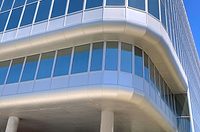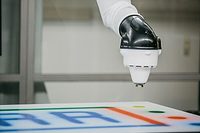Atlas® Material Testing Technology Optimizes Weathering Simulation
Atlas Material Testing Technology developed the
Right Light™ filter, which used with a xenon light source, simulates
environmental conditions at an accelerated rate.
In today's competitive markets, car manufacturers are facing increased pressures to get their products to market quickly. In particular, the paint used on the car's exterior is one crucial aspect leading to a timely sale of a vehicle. The paint on a car plays a significant role in the aesthetic appeal to attract consumers, and how that paint endures over the lifetime of the car is a determining factor in the pride of ownership of the vehicle. Manufacturers have come to rely primarily on accelerated laboratory weathering tests to track the durability and longevity of automotive exterior paint. To meet this requirement, Atlas Material Testing Technology developed the Right Light™ filter, which used with a xenon light source, simulates environmental conditions at an accelerated rate.
In an extraordinary, three-company collaboration, Dr. Mark Nichols of Ford Motor Company, Dr. Franz Ott of SCHOTT Rohrglas, and Kurt Scott of Atlas, developed specifications for the "perfect xenon lamp filter" to duplicate sunlight in the laboratory.
Sunlight is the most critical stress factor for materials exposed to the elements (i.e., exterior car paint); its precise duplication has been a perennial challenge for those tasked with developing accelerated weathering tests. According to Kurt Scott, Technical Director of Corporate R&D at Atlas Material Testing Technology, a worldwide leader in accelerated weathering technology, terrestrial sunlight is particularly difficult to duplicate in a laboratory because it rapidly increases from barely measurable irradiance, to very significant levels (several orders of magnitude) over a very narrow wavelength range.
Recent applications done with the Right Light™ filter combined with xenon-arc lamp technology have shown that material degradation more closely matches that of end-use service environments. Additionally, since the cut-on to the short-wavelength UV matches natural sunlight so well, experimenters can increase irradiance levels for greater acceleration without compromising correlation.
"This technology is especially beneficial for all exterior applications," explains Matthew McGreer, Product Manager for Atlas Material Testing Technology. "Automobiles, for example, have a consumer life-span of five to 10 years. When the consumer goes to make their next major purchase, the hope is they will have a loyalty to a brand. One way to achieve that is to have the vehicle looking as good as it did the day the consumer first purchased it."
"The precise simulation of terrestrial sunlight, particularly in the short-UV range, is even more critical for reliable weatherabilty testing of automotive coatings than originally thought," said Dr. Mark Nichols of Ford Motor Company. "Xenon light used in conjunction with the Right Light™ filter provides the appropriate ultraviolet spectrum for weathering of today's complex automotive coatings."
Atlas approached SCHOTT, a world leader in special glass production, about the key technical challenges and the deficiencies the current products experienced. The two companies worked together and, through SCHOTT's expertise in the properties of glass, and Atlas' vast knowledge of material testing, toiled through various solutions.
A pilot run of the glass produced in SCHOTT's headquarter manufacturing facility located in Mainz, Germany, was evaluated by Dr. Nichols who documented the finding to be better than originally thought. A subsequent production lot of the Right Light glass, manufactured in the SCHOTT Mittertiech Rohr Glass facility, was also successfully tested by Dr. Nichols and several other scientists. The Right Light filter is now generally available and is expected to see wide and rapid acceptance in the weather-durability community.
"Having access to SCHOTT engineers was invaluable in the process," said McGreer. "They brought us to their melt facility and worked with us to develop new glass types that would meet this unique set of requirements. SCHOTT just didn't deliver a product, they delivered a solution."
The new glass type exhibits an increased performance level in regards to UV transmission as well as longevity. Previous glass formulations used in filters contained ferric oxides (Fe2O3), which would cause the filters to degrade and required replacement after several hundred operating hours. The new glass is solarization-stable, thus extending lifetime. Looking ahead, Atlas and SCHOTT continue to research other opportunities to improve filter technology for weathering applications.
"Working closely with our customers is a key competence of SCHOTT," explains David Weimann, Business Manager, Tubing and Holloware of SCHOTT North America, Inc. "We're not only experts in glass production, but developing market-oriented solutions, because we're constantly talking with the market. Our work with Atlas is a perfect example of how a customer and a vendor can collaborate to create innovation."
In today's competitive markets, car manufacturers are facing increased pressures to get their products to market quickly. In particular, the paint used on the car's exterior is one crucial aspect leading to a timely sale of a vehicle. The paint on a car plays a significant role in the aesthetic appeal to attract consumers, and how that paint endures over the lifetime of the car is a determining factor in the pride of ownership of the vehicle. Manufacturers have come to rely primarily on accelerated laboratory weathering tests to track the durability and longevity of automotive exterior paint. To meet this requirement, Atlas Material Testing Technology developed the Right Light™ filter, which used with a xenon light source, simulates environmental conditions at an accelerated rate.
In an extraordinary, three-company collaboration, Dr. Mark Nichols of Ford Motor Company, Dr. Franz Ott of SCHOTT Rohrglas, and Kurt Scott of Atlas, developed specifications for the "perfect xenon lamp filter" to duplicate sunlight in the laboratory.
Sunlight is the most critical stress factor for materials exposed to the elements (i.e., exterior car paint); its precise duplication has been a perennial challenge for those tasked with developing accelerated weathering tests. According to Kurt Scott, Technical Director of Corporate R&D at Atlas Material Testing Technology, a worldwide leader in accelerated weathering technology, terrestrial sunlight is particularly difficult to duplicate in a laboratory because it rapidly increases from barely measurable irradiance, to very significant levels (several orders of magnitude) over a very narrow wavelength range.
Recent applications done with the Right Light™ filter combined with xenon-arc lamp technology have shown that material degradation more closely matches that of end-use service environments. Additionally, since the cut-on to the short-wavelength UV matches natural sunlight so well, experimenters can increase irradiance levels for greater acceleration without compromising correlation.
"This technology is especially beneficial for all exterior applications," explains Matthew McGreer, Product Manager for Atlas Material Testing Technology. "Automobiles, for example, have a consumer life-span of five to 10 years. When the consumer goes to make their next major purchase, the hope is they will have a loyalty to a brand. One way to achieve that is to have the vehicle looking as good as it did the day the consumer first purchased it."
"The precise simulation of terrestrial sunlight, particularly in the short-UV range, is even more critical for reliable weatherabilty testing of automotive coatings than originally thought," said Dr. Mark Nichols of Ford Motor Company. "Xenon light used in conjunction with the Right Light™ filter provides the appropriate ultraviolet spectrum for weathering of today's complex automotive coatings."
Special Glass Key to Technology
Developing a filter to closely match the UV spectrum, and that doesn't experience degradation over time, was the key challenge behind the development of the Right Light filter.Atlas approached SCHOTT, a world leader in special glass production, about the key technical challenges and the deficiencies the current products experienced. The two companies worked together and, through SCHOTT's expertise in the properties of glass, and Atlas' vast knowledge of material testing, toiled through various solutions.
A pilot run of the glass produced in SCHOTT's headquarter manufacturing facility located in Mainz, Germany, was evaluated by Dr. Nichols who documented the finding to be better than originally thought. A subsequent production lot of the Right Light glass, manufactured in the SCHOTT Mittertiech Rohr Glass facility, was also successfully tested by Dr. Nichols and several other scientists. The Right Light filter is now generally available and is expected to see wide and rapid acceptance in the weather-durability community.
"Having access to SCHOTT engineers was invaluable in the process," said McGreer. "They brought us to their melt facility and worked with us to develop new glass types that would meet this unique set of requirements. SCHOTT just didn't deliver a product, they delivered a solution."
The new glass type exhibits an increased performance level in regards to UV transmission as well as longevity. Previous glass formulations used in filters contained ferric oxides (Fe2O3), which would cause the filters to degrade and required replacement after several hundred operating hours. The new glass is solarization-stable, thus extending lifetime. Looking ahead, Atlas and SCHOTT continue to research other opportunities to improve filter technology for weathering applications.
"Working closely with our customers is a key competence of SCHOTT," explains David Weimann, Business Manager, Tubing and Holloware of SCHOTT North America, Inc. "We're not only experts in glass production, but developing market-oriented solutions, because we're constantly talking with the market. Our work with Atlas is a perfect example of how a customer and a vendor can collaborate to create innovation."
Looking for a reprint of this article?
From high-res PDFs to custom plaques, order your copy today!





